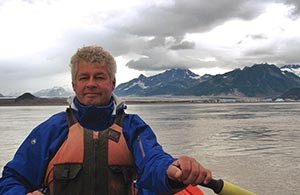
During his summer vacations from college, council volunteer John LeClair got his start in the field that he would come to love. He went to Idaho each summer to work for the Forest Service as a lookout, which evolved into a full time job as a “smokejumper,” or a firefighter who parachutes in to fight forest fires.
LeClair moved to Alaska in 1981 to work as smokejumper firefighter for the Bureau of Land Management.
“Of course, all the old-timers said, ‘you can only do this for so long.’”
LeClair’s experience led him into management positions coordinating logistics for large fires. That’s what he was doing when the Exxon Valdez ran aground in 1989.
“I was running the coordination center for logistics here in Southcentral Alaska at Anchorage,” LeClair said.
LeClair and other fire responders who knew the “Incident Command System” were called in to help coordinate response to the spill.
The Incident Command System is a standardized organizational management structure developed in the early 1970’s to manage rapidly moving wildfires. This system is now a standardized structure that has been adopted to manage all types of emergencies and incidents, including large oil spills.
“The use of the Incident Command System helps facilitate a better response,” LeClair said, “It gets everyone speaking the same language.”
LeClair ended up working in Valdez for a month after the spill, managing logistics and assisting emergency services, getting subsistence foods to Tatitlek and other villages, rescuing a sailboat from Columbia Glacier, and setting up sorely-needed lodging at the Bear Paw Campground for spill responders.
“We moved every motor home we could get out of Anchorage over there for housing.”
“Because of my incident command background, I was exposed to a lot of great opportunities,” LeClair said.
LeClair retired in 2012 from the Alaska Chadux Corporation, a nonprofit oil spill response organization. While he was there, the business grew, tripling staff and increasing its oil spill response capabilities.
In addition to being a stay-at-home-dad and volunteering for his daughter’s school, LeClair still serves on a National Area Command Team, coordinating area command logistics for very large fires involving extensive land or property and 3000-5000 fire response personnel. LeClair coordinates resources such as heavy-lift helicopters, smoke jumpers, hot shot crews, air tankers, and other large items in states such as Arizona, California, and Idaho.
LeClair joined the council’s Oil Spill Prevention and Response Committee nearly 10 years ago, and now serves as its chair. The committee works to minimize the risks and impacts associated with oil transportation. They review oil spill response plans, monitor laws and regulations, monitor oil spill drills, and investigate new technology in prevention and response.
“John’s expertise is invaluable to the issues that the committee addresses,” said council project manager Linda Swiss. “His enthusiasm and commitment make him a role model for other committee members.”
His enthusiasm has kept him optimistic when sometimes changes happen slower than he’d like.
“What I have learned is that it’s a slow process and you have to accept what you can and keep working at some of the things you can’t change, but that you’d like to see changed. Maybe you find a new tactic in the way that you present it.”
LeClair says that is where the council has value.
“The council has valid position in the scheme of things,” LeClair said. “There has to be someone paying attention to foster a better relationship the relationship between regulators, industry, and the public.”
“Prince William Sound is one of the most beautiful places on the planet, and it’s really important that with the amount of resource extraction and transportation that goes through there… you know, we are the richest country on the planet, so we should be taking care of our resources better than anywhere else in the world.”